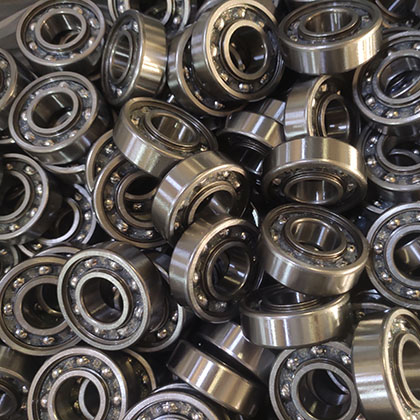
Bearing industrial
If you’re referring to bearings in the industrial context, it typically pertains to the use of bearings in various industrial applications. Bearings are critical components in machinery and equipment used across a wide range of industries, contributing to the smooth rotation of shafts and ensuring the efficient functioning of moving parts. Here are some key points related to industrial bearings:
Diverse Applications:
Industrial bearings find applications in a diverse range of industries, including manufacturing, automotive, aerospace, energy, construction, and more. They are used in machinery such as motors, pumps, conveyors, gearboxes, and various other rotating equipment.
Types of Industrial Bearings:
Different types of bearings are used in industrial settings, with ball bearings and roller bearings being the most common. Other specialized types include thrust bearings, needle bearings, and spherical roller bearings, each designed for specific applications and load requirements.
Load Handling and Radial/Axial Loads:
Industrial bearings are designed to handle both radial loads (perpendicular to the shaft) and axial loads (parallel to the shaft). The type of bearing and its configuration depend on the specific load requirements of the machinery.
High Precision and Durability:
Bearings used in industrial applications require high precision to maintain the accuracy of rotating components. They are also engineered for durability to withstand heavy loads, high speeds, and often harsh operating conditions.
Lubrication and Maintenance:
Proper lubrication is crucial for the optimal performance and longevity of industrial bearings. Lubricants reduce friction, dissipate heat, and protect against wear. Regular maintenance, including lubrication checks and replacements, is essential to prevent premature failure.
Environmental Considerations:
In certain industrial applications, bearings must withstand challenging environmental conditions such as extreme temperatures, corrosive substances, or high levels of contaminants. Specialized bearings with appropriate seals or coatings may be used to address these challenges.
Selection Criteria:
The selection of industrial bearings is based on factors like load capacity, rotational speed, precision requirements, environmental conditions, and specific industry standards. Engineers carefully choose the right type and size of bearing for each application.
Energy Efficiency:
Bearings contribute to energy efficiency in industrial machinery. By reducing friction and optimizing the movement of components, well-designed bearings help minimize energy consumption, making manufacturing processes more sustainable.
Automation and Industry 4.0:
The advent of Industry 4.0 and increased automation in industrial processes have elevated the importance of bearings. Smart bearings embedded with sensors and monitoring capabilities enable predictive maintenance, helping to prevent unexpected failures and downtime.
Vibration and Noise Reduction:
Bearings play a role in minimizing vibration and noise in industrial machinery. Properly selected and maintained bearings contribute to a quieter and smoother operation, which is crucial in applications where noise levels need to be controlled.
Large-Scale Industrial Equipment:
Heavy-duty applications, such as in mining, construction, and marine industries, often involve the use of large-scale industrial bearings. These bearings are engineered to handle immense loads and harsh environmental conditions encountered in these sectors.
R&D for Advanced Applications:
Research and development efforts continue to focus on advancing bearing technology for emerging applications. This includes developments in robotics, additive manufacturing, and other cutting-edge industries where precise motion control is essential.
Cross-Industry Collaboration:
Cross-industry collaboration is common in the development and improvement of industrial bearings. Bearing manufacturers often collaborate with industries like automotive, aerospace, and energy to understand specific requirements and incorporate technological advancements.
Global Supply Chains:
Industrial bearings are part of global supply chains, with manufacturers, distributors, and suppliers operating on an international scale. This ensures that businesses worldwide have access to the bearings required for their machinery and equipment.
Environmental Impact:
Sustainable and environmentally friendly practices are increasingly emphasized in the production and disposal of industrial bearings. Some companies focus on reducing the environmental impact of their products through eco-friendly materials and recycling initiatives.
Importance in Production Processes:
Bearings play a crucial role in maintaining the efficiency and reliability of industrial machinery. Any failure or downtime of bearings can impact production processes, leading to increased maintenance costs and potential disruptions in manufacturing.
Technological Advances:
Ongoing technological advances in materials and manufacturing processes contribute to the development of more advanced and efficient industrial bearings.
This includes the use of ceramic materials, advanced coatings, and improvements in lubrication techniques.
In summary, industrial bearings are fundamental components in the operation of machinery across various industries, ensuring the smooth rotation of components and contributing to the overall efficiency and reliability of industrial processes.
NSAR , a professional deep groove ball bearings supplier in China, provides a broad variety of deep groove ball bearings with best customer service and quality assured. With more than 20 years of deep groove ball bearings manufacture experience, our deep groove ball bearings has been exported to United States, Canada, Mexico, Brazil, Argentina.NSAR can satisfy your bulk deep groove ball bearing customization needs,We provide 6012 bearing and 6000 bearings series and 6200 bearings series and pillow block ball bearings and 6300 bearing,you can products download.

